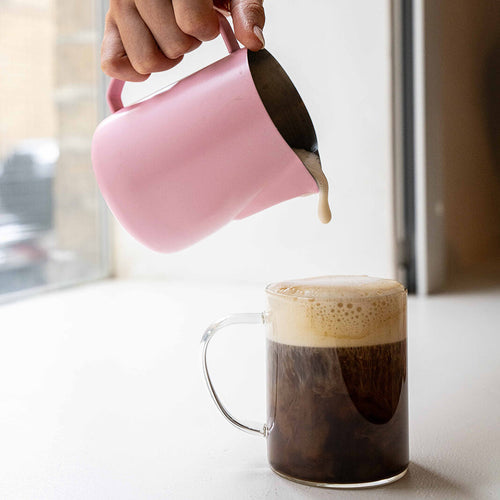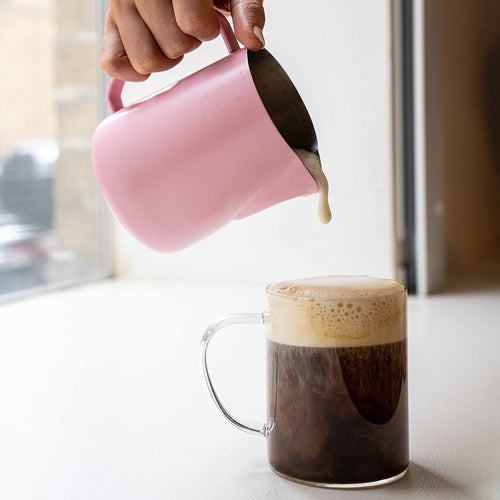You’ve fuelled yourself with coffee all morning, had a grab-and-go lunch at your desk, then the 3pm slump starts to kick in… sound familiar?
The afternoon slump is very common, it's the moment you feel your energy levels dipping, you might notice yourself yawning more, find it more difficult to focus on certain tasks and it often seems like the only solution is reaching for (another) caffeinated drink. But did you know that this afternoon habit could be disrupting your sleep cycle and overall wellbeing? Caffeine may provide a temporary boost, but for most, it comes with a crash and can disrupt your natural sleep patterns.
We explore the effects of caffeine on sleep and energy levels, and share some healthy alternatives and tips for gradually reducing your caffeine intake. Don’t worry, we’re not suggesting you quit caffeine completely, and instead we’re sharing our go-to tips and ideas to make the process a little easier for you.
Caffeine Sources and Their Content
Caffeine is found in a variety of food and drinks, and its content varies depending on the source. Coffee is a go-to for many people, with most people reporting that they feel like they can’t function without their morning coffee fix. Your average Pret coffee has around 271mg of caffeine per cup.
Energy drinks can contain even higher amounts of caffeine, with some reaching up to 300mg per serving. Other common sources include tea, chocolate, and even certain medications. A great low-caffeine option is mushroom coffee, it typically gives a much more sustained energy boost without the jittery feeling that can sometimes be associated with coffee. Take a look at Wake, a unique Mushroom Coffee blend formulated by Free Soul.
How Long Does Caffeine Stay in Your System?
To manage the effects caffeine can have on your sleep and energy levels you need to know how long caffeine stays in your system for.
On average, caffeine has a half-life of about 5 to 6 hours, meaning it takes this amount of time for half of the caffeine you've consumed to be metabolised and eliminated from your body. However, individual factors such as age, weight, metabolism, and liver function can influence how long caffeine remains in your system. Generally, it's recommended to avoid consuming caffeine at least 6 hours before bedtime to minimise its impact on your sleep quality.
Signs that Caffeine is Affecting Your Sleep and Energy Levels
- Feeling jittery
- Experiencing afternoon crashes
- Relying on caffeine to get through the day
- Difficulty falling asleep at night
If you find yourself feeling restless and experiencing difficulty falling asleep, you may not want to hear it, but caffeine might be to blame.
Many people enjoy a warming cup of tea before bed, but consuming caffeine too close to bedtime can disrupt your sleep cycle and make it harder for you to achieve a restful night's sleep. Additionally, relying on caffeine to keep you awake and alert throughout the day can lead to dependency and an energy crash once its effects wear off.
If you find your energy levels are dipping, or you're struggling to get a full 8 hours, Magnesium might be the answer. Supporting natural energy levels, promoting more restful sleep and relaxation - our 4-in-1 Magnesium + Turmeric Complex has your back.
Understanding the Relationship Between Caffeine and Sleep Quality
Caffeine works by blocking adenosine receptors in the brain, which in turn, helps us stay awake and alert. However, when consumed in excess or too close to bedtime, it can interfere with the natural sleep process.
Adenosine, a chemical that builds up in our brains throughout the day, promoting sleepiness and helping us wind down in the evening. By blocking adenosine receptors, caffeine prevents us from feeling tired and can disrupt our sleep patterns. This can lead to difficulty falling asleep, staying asleep, and achieving deep, restorative sleep.
Healthy Alternatives to Caffeine for Supporting Energy Levels
Fortunately, there are many healthy alternatives to caffeine that can help support your energy levels without interfering with your sleep.
1. Exercising to Boost Your Energy
One option is to incorporate exercise into your daily routine. We all know that exercise is so important for our health and wellbeing but we sometimes forget that it also plays an important role in our energy levels throughout the day. Physical activity increases blood flow and oxygen levels, providing a natural energy boost.
2. Eating the Right Foods
Foods rich in iron and B vitamins, such as spinach, lentils, and bananas, can help combat fatigue and increase alertness.
In addition to including these foods in your meals consider adding Free Soul Greens to boost your nutrient intake. Our greens blend is high in fibre to support digestion and provides naturally occurring vitamins and minerals essential for overall health. Adding Free Soul Greens to your routine is an easy and delicious way to ensure you're getting the nutrients your body needs to combat fatigue and increase alertness.
3. Staying Hydrated
Let’s not forget, water! Drinking plenty of water throughout the day is also important, as dehydration can cause feelings of sluggishness and low energy.
4. Free Soul Wake Mushroom Coffee
Discover a new way to boost energy sustainably with Wake by Free Soul. This mushroom coffee blend offers jitter-free energy, using the power of natural ingredients like ashwagandha, lion's mane, reishi, shiitake, and maitake mushroom extracts. With its unique combination of Arabica coffee, cocoa powder, and nutrient-rich mushrooms, Wake provides sustained energy without the crash - alongside all of the benefits of functional mushrooms.
Natural Ways to Improve Sleep Quality Without Relying on Caffeine
If you're looking to improve your sleep quality without relying on caffeine, there are several natural strategies you can try.
- Establishing a consistent sleep schedule, where you go to bed and wake up at the same time every day, can help regulate your body's internal clock and promote better sleep.
- Creating a relaxing bedtime routine, such as taking a warm bath or reading a book, signals to your body that it's time to wind down.
- Additionally, creating a sleep-friendly environment by keeping your bedroom cool, dark, and quiet can help promote better sleep.
Incorporating Caffeine Swaps into your Daily Routine
When it comes to reducing your caffeine intake, it's important to do so gradually to minimise withdrawal symptoms. One way to incorporate caffeine swaps into your daily routine is by gradually replacing caffeinated drinks with decaffeinated or even lower caffeine versions.
For example, if you're used to drinking two cups of coffee in the morning, start by replacing one cup with Free Soul Greens infused smoothies, decaf coffee or herbal tea.
Over time, you can gradually reduce the amount of caffeine in your daily routine until you no longer rely on it for energy.
Creating a Caffeine-Free Evening Routine for Better Sleep
To get a good night's sleep, one thing really is a must, a caffeine-free evening routine. Avoid all caffeinated food or drinks at least four to six hours before bedtime to give your body enough time to metabolise the caffeine.
Instead, opt for a caffeine-free drink like a calming camomile tea and enjoy some relaxing activities such as reading, meditating, or taking a warm bath.
I know we hear it all the time, but it really is important to limit exposure to electronic devices, as the blue light emitted can disrupt your sleep-wake cycle. Creating a calm and soothing environment in your bedroom, free from distractions, can also contribute to a better night's sleep.
Tips for Transitioning Away from Caffeine Gradually
Transitioning away from caffeine gradually can help minimise withdrawal symptoms and make the process feel more manageable. Start by reducing your caffeine intake by something small, like 25% each week until you reach your desired level.
Remember, the goal doesn’t have to be completely caffeine-free, small amounts of caffeine can actually have some health benefits. The aim here is to reduce it to a level that doesn’t impact your sleep and energy.
Also, remember to stay hydrated and nourish your body with nutritious foods to support your energy levels throughout the transition. Be patient with yourself and listen to your body's needs. It may take some time to adjust, but the long-term benefits of reducing your caffeine intake will be worth it. Why not take a look at Free Soul's range of Energy Supplements.
Finding the Right Balance for Your Sleep and Energy Levels
Understanding the impact of caffeine on sleep and energy levels is so important for maintaining a healthy and balanced lifestyle. By recognising the signs that caffeine is affecting your sleep and energy, you can make informed choices about your caffeine consumption.
Introducing healthy alternatives to caffeine and implementing natural strategies to improve sleep quality can help you regain your energy levels without relying on caffeine.
We know it takes time, but finding the right balance for your sleep and energy levels is a journey worth taking. Small changes can make a big difference. Take the first step towards a healthier and more balanced lifestyle today!











